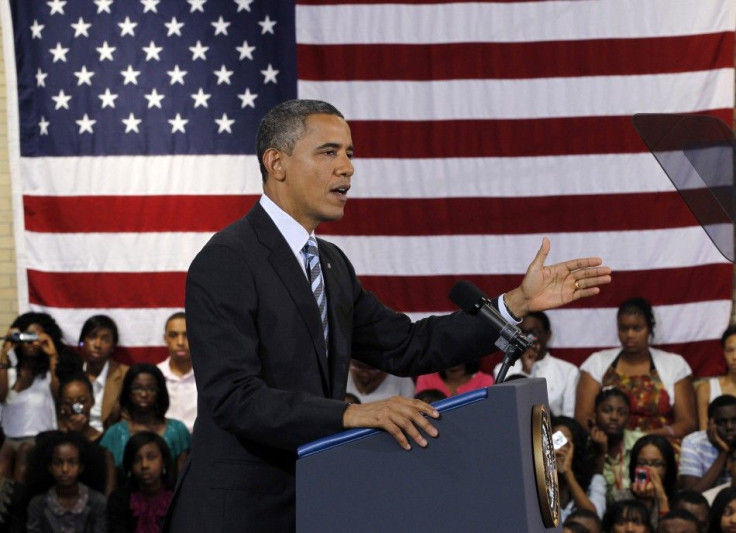Obama Jobs Plan: President Will Continue to Press Congress for Action

Despite Tuesday night's Senate Republican block of his jobs bill, President Barack Obama has pledged to continue to fight for Congressional action on the proposal -- even if parts of it have to be eliminated to attract GOP votes.
The Democrats hold a 53-47 majority in the Senate, but in partisan, modern/postmodern, go nuclear Washington, the opposition party opposes almost every measure -- even if it address a serious national problem -- just to prevent majority party from obtaining a victory.
In other words, the go nuclear political climate means that Washington is perpetually in campaign mode.
That was the case Tuesday night, when Obama and the Democrats' $447 billion jobs bill that would substantially lower the U.S.' high 9.1 percent unemployment rate passed a test vote in the Senate, but did not receive the 60 votes necessary to prevent a Republican filibuster. That meant the bill was trapped because Senate Republicans would have filibustered the bill indefinitely. In the Senate, 60 votes are need to invoke cloture, or to cut-off a filibuster.
Obama Not Taking No for an Answer
Despite the filbuster hurdle, Obama vowed to find a way to get Republicans on board at least part of his jobs plan.
We will not take no for an answer, Obama said, Usnews.com reported Thursday. We will keep organizing and we will keep pressuring and we will keep voting until this Congress finally meets its responsibilities and actually does something to put people back to work and improve the economy.
The Obama administration's job bill would provide a dose of much-needed stimulus to the current slow-growth U.S. economy.
The bill would cut the payroll tax for workers and businesses, implement other tax breaks worth about $270 billion, and also allocate $175 billion in additional fiscal stimulus to fund infrastructure projects -- including work on highways, bridges, secondary roads, and schools, among other projects.
The bill would also extend emergency jobless benefits to the long-term unemployed, for roughly $44 billion.
The plan would be paid for by a 5 percent surcharge on adults will adjusted gross incomes over $1 million per year in 2012, increasing to a 5.6 percent surcharge in 2013 percent.
Ray of Light From Speaker Boehner?
Further, while Senate Minority Leader Mitch McConnell, R-Ky., signaled that no jobs bill would pass the Senate until Democrats craft what he argued was a genuinely bipartisan bill, House Speaker John Boehner, R-Ohio, said parts of the current jobs bill may be acceptable to Republicans, and hence capable of becoming law.
Not everything the president outlined is something that we agree with; certainly not everything that we've outlined is something the president would agree with, Boehner told The Atlanta Journal Constitution. But our job on behalf of the American people is to find common ground and to do our best for them, and we will continue to do that.
Political/Public Policy Analysis: Is there cause for just mild optimism regarding an urgently-need jobs package to stimulate the fragile U.S. economy? It will depend on U.S. public opinion.
If a majority of Americans oppose additional fiscal stimulus, despite a totally unacceptable 9.1 percent unemployment rate, Republicans will feel emboldened to run out the clock -- i.e. not to anything to boost GDP growth, create jobs, and alleviate suffering -- calculating that voters will blame President Obama at election time. In other words, if the GOP concludes that it can oppose the jobs bill without paying a price, even it harms the nation, the party will.
Conversely, if most Americans view the Republicans' stance as obstruction or the equivalent of the GOP's 1948 Do-Nothing Congress that then President Harry S. Truman chastised in his successful 1948 presidential campaign, a partial jobs package is possible, and Boehner's observation hints at that public opinion concern.
At this juncture, it's too soon to tell if public opinion will coalesce in the Democrats favor, hence as of now it's advantage Republicans, to cite a tennis metaphor.
© Copyright IBTimes 2025. All rights reserved.





















